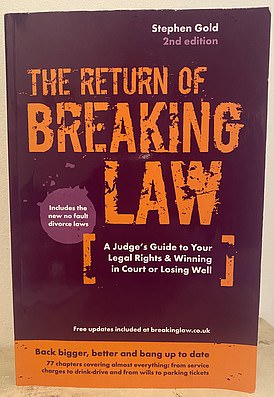
Stephen Gold: It is not easy to extricate yourself from being caned by an extra charge for car parking but while there is life, there is hope
Stephen Gold is a retired assess and author who has written popular series for This is Money on how to be a successful executor, writing a will and bankruptcy.
In his latest guide, he gives This is Money readers a hand with their Christmas shopping and returning duff gifts.
Today, he explains how to handle online sellers, win parking disputes, reply if wrongly accused of shoplifting, or make a ‘citizen’s arrest’ if you catch someone else swiping goods in a store.
Buying online has its advantages – you can usually cancel simply because you changed your mind which, as we saw previously in this guide you may be unable to do with an in-person purchase from a shop.
And it has its disadvantages – no opportunity to scrutinize or try on or to be sneezed in the face by an infected shopper in the queue.
At a distance
The right to cancel where there has been what is called a ‘distance sale’, will not apply, for example, to medical products, personalised goods (a pencil embossed in gold lettering to ‘my darling Egbert’) or goods liable to deteriorate or expire rapidly.
Where you have a right to cancel with goods, you must exercise it within 14 days of delivery.
The time for cancelling is extended if the seller has not supplied you with specified information about your right.
The extension is to 14 days from when you get that information although the right to cancel disappears should you not acquire the information within 12 months.
You can use a template cancellation form which you will find in plan 3 to the Consumer Contracts (Information, Cancellation and Additional Charges) Regulations 2013 or otherwise use your own words.
To [trader’s name, geographical address and, where available, fax number and email address].
I/we* hereby give notice that I/we* cancel my/our* contract of sale of the following goods*/for the supply of the following service*.
Order on*/received on*
Name of consumer/s
Address of consumer/s
Signature of consumer/s
Date
* Delete as appropriate
Either way, you are not required to give reasons for your decision.
The goods should be returned within 14 days of notifying cancellation at any address specified by the seller unless they have offered to collect.
You are entitled to money back including any delivery charge you paid. If you had asked for an expedited form of delivery which was more expensive than the seller’s basic form, only the lower charge is refundable.
If you have reduced the value of the goods by damaging them, the seller may make a deduction which reflects this from what you are due.
Handling them to the extent necessary to set up their ‘nature, characteristics and functioning’ is permitted and must not direct to a deduction.
The cost of returning the goods is down to you unless the seller has agreed to pay.
But when you were notified of your cancellation right, you should have been told that you would have to bear this expense if the seller was not intending to confront it. Your refund is to be made within 14 days of the seller receiving the goods back.
Where the goods are sub-standard and, as we have seen, you have a legal right to reject them, you may well want to rely not on the ‘distance sale’ right to cancel but instead on the legal right to reject, which I covered earlier in this guide.
That would particularly be the case if you have losses to claim for over and above the price you paid.
If the new washing machine blew up and destroyed your uninsured home, you would be setting your sights higher than a refund of the washing machine price and its delivery charge.
Parking perils
Preoccupied with the enormity of the discounts available, you will probably neglect you left your car in the store’s pay-for car park and overstay.
Not easy to extricate yourself from being caned by an extra charge for naughtiness but while there is life, there is hope.
Where your vehicle has been snapped going in and coming out, the car park conditions will usually trigger an extra charge if you have been parked for longer than was permitted.
In that event, time spent in getting to and from your bay should be discounted. You may be allowed a ten-minute grace period to allow for this. But on a busy day, that could be insufficient. Room for challenge there.
You should check what the parking ticket says you did wrong against what the signage stated would be wrong.
Some parking companies are fond of charging for an administration fee but did the signs refer one?
And did you know you would be charged up for parking in the first place?
Would a reasonable driver entering the car park and taking the route you would have taken, have seen at least one of the notices before parking and setting off on foot for their destination? If not, you should be unaffected by the parking conditions.
Arguing that the charge made for your wrongdoing is extortionate or extravagant won’t get you anywhere provided it did not exceed around £100.
The ‘every ticket machine was out of order and so I could not pay’ challenge may work, though.
In one case I tried as a assess, the car park notices gave an option to pay either on your phone through Ringo or, there and then, by credit card.
Ringo was out of order and the driver did not have a card on her. She left her car and managed to get through to Ringo later, away from the car park, when she paid for parking time starting from when she had actually parked.
I rejected the parking company’s argument that she could not pay retrospectively in this situation.
The company had been in breach of contract in failing to supply the pay by Ringo option, offered in the signage, to which she had agreed by parking.
You’re nicked!
Being wrongfully arrested for shoplifting would turn your shopping escapade very sour, even if it might direct to heavy damages for the civil wrongs of assault and false imprisonment. Or would it?!
Whether you might be asked to accompany the store detective to the manager’s office or, during the current thieving epidemic, fancy making an arrest yourself, allow me to explain how you legally stand with a citizen’s arrest.
The store detective and you have equal rights to arrest someone suspected of an indictable crime – that’s a crime triable at the Crown Court – such as shoplifting.
They are weaker than the rights of a police officer. A store detective or you can arrest someone in the act of shoplifting or who you have reasonable grounds to suspect is in the act.
If you are wrong and did not have reasonable grounds to suspect, you could be in trouble. They pocketed a product? Maybe they intended to pay at the checkout. They looked shifty? So do some lay preachers and Members of Parliament.
But say it is thought that the theft has already taken place, with the perpetrator having left the shop without paying and en route to the next supermarket? More complicated.
This time the store detective from the first shop or you may be able to arrest provided the person was guilty or you had reasonable grounds to suspect they were guilty.
Could they have left the first shop believing they had paid and not have behaved dishonestly? They might have been on medication that made them absent- minded.
And supposing your suspicions turned out to be unreasonable in the circumstances? Oh dear. It gets worse.
There would be no power to arrest anyway unless this was believed to be necessary to impede physical injury being caused or suffered, property damage being caused, or the person arrested making off before a police constable could take over.
There would also be no power where it would be reasonably practicable for a police constable to make the arrest instead.
If you are the victim and incorrectly challenged by a store detective to go to the manager’s office, do go (even though your next-door neighbour is watching), but make it clear you are going under compulsion and not voluntarily.
Otherwise, you could not claim you had been falsely imprisoned in the manager’s office.
Having heard all this, you may have concluded that the recent plea by Chris Philp, the Minister of State for Crime, Policing and Fire (who is still in his post), that greater use of citizens’ arrest would be a useful development, was not such a good idea.
Happy shopping.
Some links in this article may be affiliate links. If you click on them we may earn a small commission. That helps us fund This Is Money, and keep it free to use. We do not write articles to advocate products. We do not allow any commercial relationship to affect our editorial independence.




